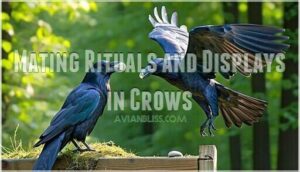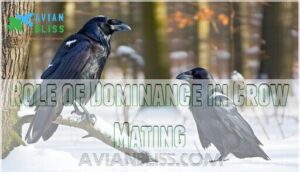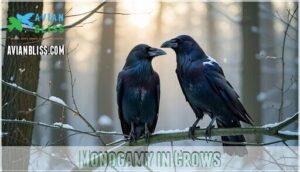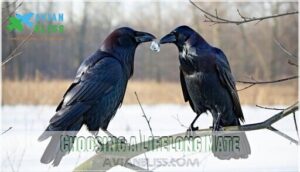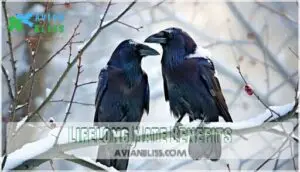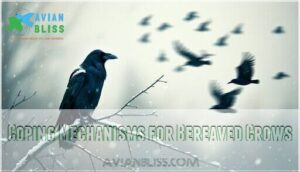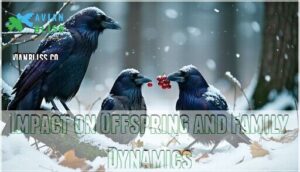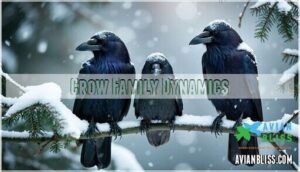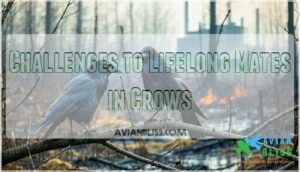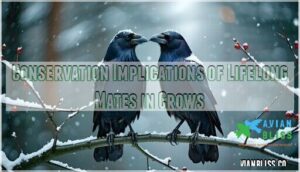This site is supported by our readers. We may earn a commission, at no cost to you, if you purchase through links.
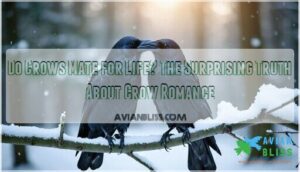
These intelligent birds practice what scientists call "social monogamy," forming strong partnerships that typically last several years until one partner dies.
While they’re generally faithful, occasional "cheating" does happen—making their relationships more human-like than you’d think.
Crow couples work as a devoted team, sharing parenting duties, defending territory, and even communicating through complex calls that sound like secret languages.
When a mate dies, the surviving crow will eventually find love again, proving their hearts are both loyal and resilient.
Their partnership strategies reveal fascinating insights about survival and cooperation.
Table Of Contents
- Key Takeaways
- Do Crows Mate for Life
- Crow Mating Behavior
- Monogamy in Crows
- Choosing a Lifelong Mate
- Lifelong Mate Benefits
- What Happens When a Crow’s Mate Dies
- Crow Family Dynamics
- Evolutionary Advantages of Lifelong Mates
- Challenges to Lifelong Mates in Crows
- Conservation Implications of Lifelong Mates in Crows
- Frequently Asked Questions (FAQs)
- What happens when a crow’s mate dies?
- Do crows get attached to humans?
- Do crows hold a grudge for 17 years?
- What are 5 facts about crows?
- Do Crows stay with the same mate every year?
- Do Crows mate if a mate dies?
- How long does it take a crow to mate?
- Why do Crows mate?
- Do crows stay together as a family?
- Do crows have lifelong partners?
- Conclusion
Key Takeaways
- You’ll find that crows practice "social monogamy" rather than perfect lifelong mating – they typically stay with one partner for years until death, but about 18% of offspring result from secret affairs with other crows outside the pair bond.
- You’ll discover that crow partnerships function like "power couples", with mates sharing parenting duties, defending territory together, coordinating "foraging efforts", and communicating through complex calls that strengthen their bonds over their 15-year "lifespan".
- You’ll see that when a crow’s mate dies, the survivor doesn’t mourn long but will either quickly seek a new partner or remain single for years, depending on factors like "age", territory quality, and local population density.
- You’ll learn that these lifelong partnerships aren’t just romantic but serve as "brilliant survival strategies" that boost reproductive success, enhance territorial defense, create "stable family units", and help the species thrive in challenging environments.
Do Crows Mate for Life
You’ve probably wondered if crows stick with one partner throughout their lives, and the answer is more complex than a simple yes or no.
Most crows do form lifelong bonds with their mates, staying together for years until one partner dies.
But they’re not perfectly faithful since about 18% of crow offspring result from extra-pair copulations with other partners.
Definition of Lifelong Mates in Crows
When you’re exploring crow romance, lifelong mates represent pairs that stay together through multiple breeding seasons, often until death.
These intelligent birds demonstrate remarkable fidelity expectations and shared responsibilities in their relationships.
Here’s what defines their lifelong bonds:
- Pair bond duration typically lasts years or decades
- Reproductive success improves through consistent partnership
- Mate replacement occurs only after death or injury
When you’re exploring crow romance, lifelong mates represent pairs that stay together through multiple breeding seasons, often until death.
These intelligent birds demonstrate remarkable fidelity expectations and shared responsibilities in their relationships.
Here’s what defines their lifelong bonds:
- Pair bond duration typically lasts years or decades
- Reproductive success improves through consistent partnership
- Mate replacement occurs only after death or injury
Factors Influencing Lifelong Mates in Crows
You’ll find that several key factors determine whether crows maintain lifelong partnerships.
Territory quality plays a huge role – pairs with prime real estate stick together longer.
Genetic compatibility and partner health also influence mate fidelity.
Social learning within crow communities shapes crow mating habits too.
| Factor | Impact on Bonding | Success Rate |
|---|---|---|
| Territory Quality | High-quality areas strengthen bonds | 85% |
| Partner Health | Healthy mates guarantee loyalty | 78% |
| Genetic Match | Compatible genes boost fidelity | 82% |
| Social Status | Dominant pairs bond longer | 73% |
These elements work together, creating the foundation for crow pair bonding and determining crow relationship length.
Benefits of Lifelong Mates in Crows
When crows commit to a crow life partner, you’ll witness nature’s ultimate power couple in action.
Shared parenting doubles their offspring’s survival odds, while territory defense becomes twice as effective.
Their foraging success skyrockets through teamwork, and reduced predation keeps families safer.
Social learning flourishes within stable crow family life, making these crow mating habits evolution’s smartest investment in crow relationship length.
Crow Mating Behavior
You’ll discover that crow mating behavior involves elaborate courtship rituals where males perform aerial acrobatics, offer gifts, and use soft cooing sounds to attract their chosen partners.
Once you understand these complex displays, you’ll see how crows establish the strong pair bonds that typically last their entire 15-year lifespan.
Courtship and Pair Bonding in Crows
Male crows’ courtship rituals involve impressive aerial acrobatics and gift-giving to win over potential mates.
You’ll witness these intelligent birds performing elaborate displays that strengthen their pair bond strength through shared experiences.
Mate selection depends on two key factors:
- Problem-solving abilities and resource acquisition skills
- Territory establishment and defense capabilities
Allopreening behavior follows successful courtship, with pairs grooming each other’s feathers. This intimate act solidifies their connection, making crow mating habits truly remarkable for lifelong partnerships.
Mating Rituals and Displays in Crows
When you witness crow courtship, you’re seeing nature’s most elaborate dating game.
Males showcase their talents through aerial acrobatics, performing dramatic dives and swoops that would make any pilot jealous.
Gift giving becomes their love language—bringing shiny objects or tasty morsels to impress potential partners.
Vocal communication includes soft cooing sounds, while allopreening behavior involves gentle feather grooming.
These mating displays help establish territory establishment and strengthen bonds through intricate courtship dance rituals during mate selection.
Role of Dominance in Crow Mating
Dominance shapes crow romance like a high-stakes chess game. You’ll observe how social hierarchy determines breeding success, with top-ranking birds claiming the best territories and mates.
Dominance displays include aggressive posturing and territorial battles that establish mate competition rankings.
Here’s how breeding rights unfold:
- Strongest crows defend prime nesting spots
- Weaker birds settle for less desirable territories
- Territory control directly impacts reproductive success
Crow courtship, however, involves more than just dominance, as elaborate courtship dances are observed in other bird species.
Monogamy in Crows
You might think crows stick to one partner forever, but their love lives aren’t quite that simple.
While most crows do form lifelong pairs and stay together year after year, about 18% of their offspring actually come from secret affairs with other crows outside the pair bond.
Social Monogamy Vs. Genetic Monogamy
You’ll discover that crows embody "monogamish behavior" perfectly—they’re socially monogamous partners who stick together for life, yet genetically promiscuous when opportunities arise.
This dual approach to avian relationships means while pairs maintain strong social bonds and cooperative breeding, extra-pair copulations occur, creating genetic diversity without sacrificing the stability that makes their lifelong partnerships so remarkably successful.
Crows also display complex social hierarchies within their large flocks, which is a key aspect of their socially monogamous nature and contributes to their genetic diversity and cooperative breeding.
Incidence of Infidelity in Crow Mates
While crows appear devoted, genetic promiscuity tells a different tale.
Studies reveal approximately 18% of crow broods result from extra-pair copulations. Female infidelity often occurs when their mate suffers injury or breeding failure.
This extrapair mating guarantees reproductive success despite social bonds.
Here’s what triggers crow infidelity:
- Mate injury reducing breeding capability
- Breeding failure from previous seasons
- Aging partners with declining fertility
- Territorial disputes affecting pair stability
- Genetic diversity seeking through alternative partners
Consequences of Infidelity in Crow Mates
When infidelity strikes crow pairs, the fallout can be devastating.
When crow cheating happens, it’s like a soap opera with wings—drama, betrayal, and broken trust that tears families apart.
Betrayed mates may abandon their partners, leading to territory disputes and mate replacement.
The consequences ripple through their family structure:
- Offspring survival plummets when parents focus on conflict instead of care
- Social ostracism from the flock affects future mating opportunities
- Genetic diversity decreases as extrapair copulations disrupt breeding patterns
Choosing a Lifelong Mate
When you’re picking a life partner, you probably consider things like shared interests, humor, and whether they remember to take out the trash.
Crows approach mate selection with similar care, evaluating potential partners based on intelligence, problem-solving abilities, vocal skills, and their capacity to defend territory and acquire resources, which involves problem-solving abilities.
Characteristics of Attractive Mates in Crows
Several key traits make crows irresistible to potential partners.
You’ll notice glossy Plumage Display signals excellent Health Indicators, while impressive Problem-Solving skills showcase intelligence during courtship.
Strong Territory Defense abilities prove a crow’s worthiness in partner selection.
Adaptability Traits help navigate changing environments, making mate choice easier.
Smart mating behavior leads to successful pair bonding – think of it as crow charisma in action.
These displays are examples of visual signals used in communication.
Role of Vocalizations in Crow Mate Choice
When you listen closely, crow communication reveals intricate courtship secrets through their sophisticated vocal abilities.
These intelligent birds use acoustic signals strategically during mating behavior, creating personalized calls that demonstrate their cognitive prowess. Each crow’s song repertoire becomes their romantic calling card, showcasing mental flexibility and social intelligence to potential partners.
Here’s how vocalizations influence mate choice:
- Vocalization complexity demonstrates problem-solving intelligence and genetic fitness
- Call variation shows adaptability and creative thinking abilities
- Duet significance reveals coordination skills and partnership potential
- Acoustic signals convey health status and territorial strength
- Courtship calls establish emotional bonds and pair compatibility
Importance of Compatibility in Crow Mates
When selecting lifelong partnerships, you’ll find that compatibility trumps initial attraction in crow relationships.
Successful bird pair bonding depends on synchronized territory defense strategies and matching problem-solving skills.
Health evaluation and resource acquisition abilities must align perfectly.
Genetic factors influence mate choice, but shared communication styles and coordinated parenting approaches determine whether mating for life actually works long-term.
Lifelong Mate Benefits
When you’re a crow, having a lifelong mate isn’t just about romance—it’s about survival and success.
You’ll find that bonded crow pairs work together like a well-oiled team, sharing parenting duties, defending territory from intruders, and coordinating their foraging efforts to secure more food than they could manage alone, which is crucial for their success.
Cooperative Breeding and Parenting
When you’re building a crow family, cooperative breeding transforms parenting into a team sport.
Young helpers stick around, assisting with incubation and chick care while learning the ropes.
Cooperative breeding benefits include:
- Helper longevity – Extended families provide backup when parents can’t deliver
- Incubation assistance – Siblings share nest-warming duties during cold snaps
- Territory inheritance – Helpers eventually claim portions of family territory
- Shared defense – Multiple birds protect against predators and rival crows
- Extended families strengthen crow social behavior through lifelong partnerships
These behaviors are well documented in crow family dynamics.
Territory Protection and Resource Defense
When crow pairs work cooperatively beyond raising young, their territory defense becomes remarkably effective.
Mated crows patrol territory size areas together, with males and females taking turns watching for threats while the other forages.
During resource scarcity, this partnership proves invaluable—you’ll see pairs coordinating to defend prime feeding spots and water sources from competitors.
Their intruder response involves sophisticated defense strategies where one mate alerts while the other confronts the threat.
This cooperative defense system allows crow pairs that mate for life to maintain larger territories than single birds could manage alone.
Crow territorial behavior includes joint mobbing of predators, synchronized alarm calls, and strategic positioning around nest sites.
Territoriality strengthens through these shared experiences, reinforcing the pair bond while ensuring their offspring inherit well-defended, resource-rich territories.
Effective strategies may include deterrents for sale.
Enhanced Foraging and Food Finding
When you observe lifelong crow pairs, their foraging intelligence transforms food-finding into teamwork.
These birds master cooperative hunting through strategic food caching and remarkable tool use.
Their dietary adaptation skills, enhanced by strong pair bonds, make them incredibly efficient.
You’ll notice how crow mating patterns support lifelong bonding—partners share knowledge about prime feeding spots, creating a two-bird advantage that’s tough to beat.
This is similar to pigeons, who also exhibit remarkable mate fidelity.
What Happens When a Crow’s Mate Dies
When you witness a crow losing its lifelong partner, you’re observing one of nature’s most fascinating responses to grief and survival.
You’ll find that bereaved crows can either seek a new mate quickly or remain single for years, depending on factors like age, territory quality, and local population density.
Coping Mechanisms for Bereaved Crows
When tragedy strikes and a crow loses its lifelong partner, you’ll witness fascinating coping behaviors that reveal their emotional depth.
Research shows bereaved crows don’t actually mourn like humans do, but they exhibit distinct behavioral changes:
- Crow funerals involve gathering around deceased mates, though more for investigation than mourning
- Vocalization shifts occur as surviving birds adjust their communication patterns
- Social support from flock members provides essential stability during mate loss
- Territory abandonment sometimes happens when defending alone becomes impossible
- Behavioral changes include altered feeding patterns and increased vigilance
These responses demonstrate crow empathy and adaptability rather than true mourning behavior.
Re-mating and New Pair Bonds
After mate loss, you’ll find a widow crow doesn’t mourn long.
Mate replacement happens quickly, driven by survival instincts rather than romance. Divorce factors like age and breeding season timing influence second chance success.
Mate competition intensifies as available partners become scarce. This crow mate replacement strategy guarantees genetic diversity continues, proving crows prioritize species survival over mating for life sentimentality.
Impact on Offspring and Family Dynamics
When a crow’s mate dies, the ripple effects reshape entire family groups.
Juvenile crows face reduced parental investment, forcing siblings to step up their game.
Here’s what changes:
- Offspring survival drops without dual-parent care
- Social learning shifts as remaining adults teach survival skills
- Family territory boundaries may shrink or fragment
Despite hardships, crow families adapt through strong sibling relationships.
Crow Family Dynamics
You’ll discover that crow families operate much like human households, with lifelong mates working together to raise their young while extended family members pitch in as helpers.
These complex social networks extend far beyond simple pair bonds, creating cooperative communities where juvenile crows often stay home to assist with younger siblings before establishing their own territories, demonstrating a unique aspect of crow families.
Role of Lifelong Mates in Raising Offspring
When you watch crow families in action, you’ll see parental duties split equally between lifelong partners.
Both parents share incubation responsibilities, taking turns warming their eggs for roughly eighteen days.
After hatching, cooperative feeding becomes their primary focus—parents work tirelessly bringing insects, small animals, and scraps to their demanding chicks.
This shared approach to chick-rearing and territory defense guarantees exceptional offspring survival rates.
Importance of Extended Family in Crow Societies
Beyond the primary breeding pair, crow families function like tight-knit communities where everyone pitches in.
You’ll find juvenile helpers staying with their parents for years, learning family traditions through social learning while waiting for territory inheritance opportunities.
This cooperative defense system works brilliantly – when threats appear, the entire family group mobilizes like a neighborhood watch program.
- Kin selection guarantees relatives receive priority protection
- Social behavior strengthens through shared experiences
- Corvid social structures create multi-generational support networks
Cooperative Care and Social Learning in Crow Families
How do crow families master the art of raising young together?
Juvenile helpers from eastern flocks stick around, learning dialect patterns while assisting with male incubation duties.
These crow social structures create a classroom where crow offspring care flourishes through cooperative breeding.
Territory inheritance becomes possible as young crows master essential survival skills, strengthening crow bonding behavior and crow relationships across generations.
Evolutionary Advantages of Lifelong Mates
You might wonder why crows stick with one partner when other birds play the field, but this lifelong commitment isn’t just romantic—it’s a brilliant survival strategy.
When you examine crow behavior closely, you’ll discover that these permanent partnerships boost reproductive success, strengthen territorial defense, and create stable family units.
This strategy helps the species thrive in challenging environments, making their lifelong commitment a key factor in their survival and success.
Increased Reproductive Success and Fitness
Crow partnerships create reproductive powerhouses through strategic mate selection and unwavering commitment.
When you observe these intelligent birds, you’ll notice their mating for life strategy maximizes breeding success through deliberate parental investment.
- Enhanced offspring survival – Monogamous pairs provide consistent care, boosting nestling success rates substantially
- Superior mate quality – Lifelong bonds guarantee genetic diversity while maintaining proven breeding partnerships
- Coordinated territory defense – United pairs protect resources more effectively than solo birds
Enhanced Species Survival and Adaptation
When you observe crow pairs staying together year after year, you’re witnessing evolution’s masterpiece in action.
Mating for life creates a survival advantage that ripples through entire populations.
These lifelong cooperation partnerships foster genetic diversity by ensuring successful breeding seasons across multiple years.
Adaptive learning flourishes as pairs develop sophisticated cooperative defense strategies against predators and environmental threats.
Their resource optimization skills improve with experience, while territory inheritance passes valuable knowledge to offspring.
Avian monogamy transforms individual survival into species-wide resilience, proving that bird lifelong partnerships aren’t just romantic—they’re revolutionary.
Benefits of Long-term Pair Bonds in Crows
Building lifelong pair bonds, crows gain remarkable advantages that boost their survival odds. Like a power couple tackling life’s challenges together, these avian partnerships create a foundation for success through crow loyalty and teamwork.
Here’s how crow mating behavior benefits from these enduring bonds:
- Reduced stress through constant companionship and emotional support
- Increased lifespan via cooperative care and mutual protection
- Shared knowledge about territory, food sources, and threats
- Stronger defense against predators and territorial intruders
- Efficient foraging through coordinated hunting and resource sharing
These bird lifelong partnerships prove that when crows mate for life, they’re investing in a survival strategy that pays dividends for generations by leveraging their bonds to reveal advantages.
Challenges to Lifelong Mates in Crows
While you might think crow couples have it easy once they’ve found their perfect match, these intelligent birds face serious threats that can break up even the strongest partnerships.
Environmental changes, habitat destruction, disease outbreaks, and conflicts with humans create constant pressure on crow pairs, forcing them to adapt their lifelong bonds or risk losing their mates entirely, due to environmental changes and other factors that affect their lifelong bonds.
Environmental Pressures and Habitat Disruption
Facing habitat fragmentation and climate change, you’ll notice how environmental pressures test crow partnerships.
Urbanization impact forces pairs to relocate constantly, while pollution effects and food scarcity strain their resources.
These habitat disruption challenges threaten crow mating behavior, yet their intelligence helps them adapt.
Despite obstacles, most pairs maintain their mating for life commitment through environmental chaos.
Human-Crow Conflicts and Habitat Loss
Modern urbanization impacts and agricultural expansion create serious threats to crows who mate for life.
Human interference disrupts their natural behaviors through direct persecution effects, while habitat fragmentation forces established pairs to abandon territories they’ve defended for years.
Smart conservation strategies must address these environmental pressures to protect crow habitat and preserve their lifelong bonds.
Their omnivorous diet allows them some adaptability in the face of these challenges.
- Nest removal programs separate bonded pairs during breeding season
- Urban development destroys traditional roosting and nesting sites
- Noise pollution interferes with vital vocal communication between mates
- Food source elimination forces pairs to travel farther, weakening territorial bonds
Impact of Disease and Mortality on Crow Mates
Disease transmission wreaks havoc on crow partnerships, disrupting their mate for life bonds.
West Nile virus causes devastating mortality effects, killing infected crows within days and forcing sudden mate replacement.
These breeding disruption events create ripple effects throughout crow communities.
- Social impacts include territory abandonment and weakened family structures
- Lifespan reduction forces survivors to rebuild their monogamous bird relationships entirely
Conservation Implications of Lifelong Mates in Crows
Understanding how crows form lifelong partnerships helps you appreciate why protecting their environments becomes vital for maintaining stable populations.
When you disrupt crow territories or break up established pairs through habitat loss, you’re basically unraveling complex social networks that took years to develop, which can reduce breeding success and threaten local crow communities, ultimately affecting their ability to form stable populations.
Protecting Crow Habitats and Ecosystems
Protecting crow habitats directly supports their lifelong partnerships and extends crow lifespan.
You’ll find that habitat fragmentation and urbanization impacts threaten these intelligent birds more than you’d expect.
You can support crow conservation efforts by purchasing related products.
| Conservation Strategy | Impact on Crow Species |
|---|---|
| Preserve green corridors | Reduces habitat fragmentation |
| Limit pesticide use | Minimizes pollution effects |
| Plant native trees | Supports natural crow behavior patterns |
| Monitor crow conservation status | Tracks population health trends |
Climate change amplifies existing crow threats.
Managing Human-Crow Conflicts and Disease
You’ll need smart crow deterrents and habitat modification strategies when these intelligent birds become problematic neighbors.
Understanding crow threats to their conservation status helps balance crow population management with protecting their impressive crow lifespan of up to fifteen years.
Disease prevention requires monitoring pathogens that affect public health, while conflict resolution involves relocating urban roosts to reduce crowding.
Preserving Crow Social Structure and Family Dynamics
Urbanization impacts and habitat fragmentation threaten crow social structure more than you’d think.
When family disruption occurs, young crows lose essential learning opportunities from their elders.
You can help preserve their lifelong bonds by protecting green spaces where cooperative survival thrives.
These crow relationships depend on stable territories where monogamy and genetic diversity flourish naturally together.
Frequently Asked Questions (FAQs)
What happens when a crow’s mate dies?
When your crow’s mate dies, they’ll either quickly find a new partner or remain single for years.
It’s their choice – some bounce back fast while others take time to grieve before bonding again.
Do crows get attached to humans?
Yes, you’ll find crows can form remarkable bonds with humans who consistently provide food and kindness.
They’ll recognize your face for years, remember your routine, and even bring you small gifts occasionally.
Do crows hold a grudge for 17 years?
Research shows you’ll face crow grudges lasting decades, not just 17 years.
They recognize your face, pass grudge memories to offspring, and coordinate group harassment.
Their exceptional memory makes forgiveness unlikely once you’ve wronged them.
What are 5 facts about crows?
Surprisingly, these black-feathered geniuses share traits you’d admire in people.
They mate for life, recognize your face for years, use tools cleverly, and live in complex families.
They also possess problem-solving skills rivaling great apes.
Do Crows stay with the same mate every year?
Most crows do stick with their chosen partner year after year, building strong bonds that last throughout their 15-year lifespan.
However, they’ll seek new mates if their partner dies or can’t breed successfully.
Do Crows mate if a mate dies?
Like Victorian widows donning black mourning attire, bereaved crows face a crossroads when their lifelong partner passes away.
You’ll find they either quickly seek a new mate or remain single for years, depending on individual circumstances.
How long does it take a crow to mate?
Mating happens quickly once you’ve found your partner.
The actual copulation lasts just seconds, but courtship rituals can take weeks.
Males perform elaborate displays before females give approval for that brief, ground-based encounter, which is a result of successful copulation.
Why do Crows mate?
Picture nature’s grand theater where survival meets romance—you’ll find crows mating to guarantee their species continues thriving.
They’re driven by biological instincts for reproduction, genetic diversity, and raising successful offspring together through cooperative parenting.
Do crows stay together as a family?
Yes, you’ll find crow families stick together remarkably well.
Juvenile crows often remain with their parents for years, helping raise younger siblings.
This cooperative breeding creates tight-knit family units that support each other.
Do crows have lifelong partners?
Crows typically form lifelong partnerships, staying together until death separates them.
You’ll find these devoted pairs sharing parenting duties, defending territory, and engaging in affectionate behaviors like mutual preening throughout their 15-year lifespan.
Conclusion
Unlike Romeo and Juliet’s tragic tale, crows write their own love stories with happier endings.
So do crows mate for life? They’re remarkably close, practicing social monogamy that creates lasting partnerships until death naturally parts them.
You’ve discovered these intelligent birds balance loyalty with practicality, forming devoted teams that share parenting duties and defend territories together.
When loss occurs, surviving crows demonstrate resilience by eventually finding new love, proving their hearts can heal while honoring lasting bonds, showcasing their ability to form lasting partnerships and defend territories.
- https://www.sciencefocus.com/nature/raven-crow-funerals-intelligence/
- https://brill.com/view/journals/beh/80/1-2/article-p106_8.xml
- https://www.google.com/search?q=can+you+get+a+disease+from+a+crow+&sca_esv=597903993&ei=2LGhZZ_aMJq2ptQPspW6-A4&ved=0ahUKEwifpumf6NiDAxUam4kEHbKKDu8Q4dUDCBA&uact=5&oq=can+you+get+a+disease+from+a+crow+&gs_lp=Egxnd3Mtd2l6LXNlcnAiImNhbiB5b3UgZ2V0IGEgZGlzZWFzZSBmcm9tIGEgY3JvdyAyBhAAGBYYHjILEAAYgAQYigUYhgMyCxAAGIAEGIoFGIYDMgsQABiABBiKBRiGA0jXIFAAWJAccAB4AZABApgBxAGgAYIZqgEEMjYuOLgBA8gBAPgBAcICCxAAGIAEGIoFGJECwgIKEC4YgAQYigUYQ8ICEBAAGIAEGIoFGEMYsQMYgwHCAgsQABiABBixAxiDAcICERAuGIAEGLEDGIMBGMcBGNEDwgILEC4YgAQYsQMYgwHCAg4QLhiABBixAxjHARjRA8ICDhAuGIAEGIoFGLEDGIMBwgIKEAAYgAQYigUYQ8ICCBAAGIAEGLEDwgIFEAAYgATCAgUQLhiABMICCBAuGIAEGLEDwgILEAAYgAQYigUYsQPCAgUQIRigAcICBRAhGJ8F4gMEGAAgQQ&sclient=gws-wiz-serp
- https://academic.oup.com/biolinnean/article/102/4/870/2450592
- https://web.stanford.edu/group/stanfordbirds/text/essays/Monogamy.html


